“No news from God†reads the catching title of a movie. I am not interested in the movie; instead I am intrigued by its title, which I find dramatic and somehow irreverent, particularly during these days of Advent and Christmas season. That is why I paraphrase it for my 2011 Christmas message.
No news from God!! How distressing if it were true! For distressing indeed is having no news when these are of life and death. And the news from God are of such calibre. The strange thing, however, is the fact that many people around us are neither distressed, nor worried, and nor even bothered about living “without news from God.†Why? Just because they do not see their importance and also, in many instances, because they neither expect them. Sad and tragic, but this is how we are.
And what about us, Dominicans, missionaries, members of Our Lady of the Rosary Province? Do we have news from God? Of course we have. And good news indeed. We have actually accepted a saving message with the commitment even to spread it: the Gospel of Jesus Christ. It is our firm belief that God has been incarnated in Jesus of Nazareth and that through him, His Son, has spoken and saved us. This is good news of Love and Life. That is why there is rejoicing in our hearts and we, deeply grateful, feel the urgency to bring the news to others.
But how to explain the awesome “silence†of God dealt with by Spiritual Theology; a silence that impels people to question God and even leads us sometimes to lose pleasure in prayer?… Doctors of the Church know how to answer: “It is not so much silence on the part of God,†they say, “as rather lack of willingness to listen to Him on ours’.†“For in giving us, as He did, His Son, which is His Word – and He has no other – He spoke to us all together, once and for all, in this single Word, and He has no occasion to speak further.†(St John of the Cross)
Brothers, I greet you this Christmas season with News from God. News that in this time in history He conveys through his Son, his Word made flesh. Let us open then our ears and listen attentively. Let us open also our heart: because messages of Love are heard with it. And if, in spite of all, we still undergo through moments of silence from God… know that it is because “there is no occasion for Him to speak furtherâ€; because He has told us already everything.
Merry Christmas and a Blessed Year 2012!
Fr. Javier
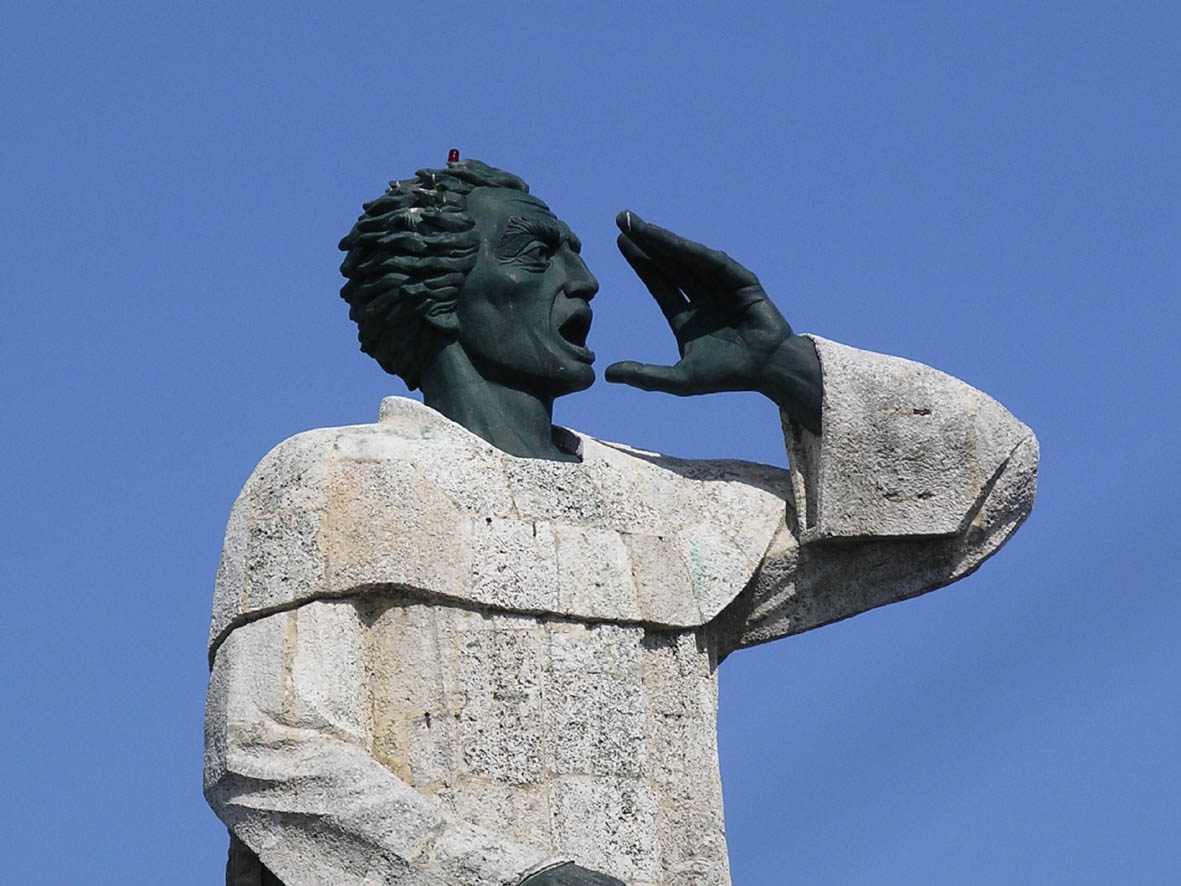
      The season of Advent is the season of hope, which is the virtue of the pilgrim – of our life. Hope like a coin has two faces: one relates us to God; another, to the neighbor, particularly the poor and needy neighbor. Advent then is a special time for Christians to become more aware of and committed to the poor around us and in our world.
            Concerning the love of preference for our poor neighbors, the Gospel of Jesus Christ is focused on the proclamation of justice and love, which are the two main social values and virtues to be preached and practiced by Christians – and many other believers and men and women of good will. This proclamation includes the denunciation of injustices, and the announcement and witnessing of justice and love.
            Social action is a constitutive dimension of the “preaching of the Gospel, or the Church’s mission†(Synod of Bishops’ 71). A shining moment of the proclamation of the social Gospel is represented by the well-known Homily of Dominican Father Antonio Montesinos for the Third Sunday of Advent of the year 1511 in the Isla Española, now the Dominican Republic. As asked by their latest General Chapter (Rome 2010), the Dominicans throughout the world are re-calling this Advent of 2011 the prophetic Advent Sermon preached 500 years ago.

       What makes that prophetic sermon still more relevant for us Dominicans today  is the fact that it was prepared not only by Montesinos but by the whole Dominican community. The community read the signs of their times and interpreted them according to the Sacred Scriptures and the consequent teachings of the Fathers of the Church and, in particular of Saint Thomas Aquinas (cf. II-II, 66).The Dominican community of the Española applied courageously the doctrine taught by the Dominican Masters of Theology at the University of Salamanca regarding the equality of all human beings, including the natives of Latin America, who were unequally treated by the greedy colonizers of that time.  Montesinos thundered from the pulpit five hundred years ago in Central America:
By what right and by what justice do you hold these Indians in such a cruel and horrible servitude? With what authority have you carried out such detestable wars against these people who were living in their meek and peaceful lands that you have consumed with deaths and ravages never heard of? How can you hold these peoples so oppressed and exhausted by not giving to them the food they need to eat, and by not healing their illnesses which are due to the excessive works you force upon them? Thus they die, or –better said – you kill them in order to acquire the precious gold every day! Do you care at all about letting them know God as their Creator… and fulfill their Sunday obligation? Are these people not human beings? Don’t they have rational souls? Are you not obliged to love them as you love yourselves? … Be sure that in this state in which you are you will not be saved…
            After that incredible sermon, the authorities attending the Mass, the masters of the Indians complained to the Superior of the community, Fr. Pedro de Córdoba, and asked him to call the attention of Montesinos, punish him for this “new doctrine,†and ask him to recant what he had said at the following Sunday Mass, the Fourth Sunday of Advent. If the preacher would not correct himself and apologize they all will be sent back to Spain. Thereafter, the community prepared another sermon for the Fourth Sunday of Advent. Montesinos proclaimed it again: not recanting at all what he had said the previous Sunday, but reaffirming again with strong words the same radical and prophetic message. On the Fourth Sunday of Advent, he reportedly said:
You are enslaving the natives. If you continue like this, we shall not hear your confession. And know that we believe that we are not offending the King. On the contrary, we are thus serving God and also the King of Spain.Â
Again, Montesinos called the rich and powerful to repent and change their unjust and merciless misbehavior against the dignity and the kindness of the natives.
            The enslavement of the poor by the insensitive rich and powerful – and also by the indifference of many of us who could do something to remedy this cruel situation but do not -, continues to be a terribly negative sign of our times: injustices, violence, greed, human trafficking, discrimination based on sex, age, nationality or ethnic, religion are still here in our developed and developing world. What to do? Imitate the courage and witnessing of Montesinos and others. We are asked by our humanity and our faith to continue condemning injustices, but at the same time giving always hope to our people like the true prophets of yesterday and today, and like the Prophet, Jesus Christ.
            Indeed, and following the social teachings of the Church – more explicit and   radically since John XXIII – and of the best theologians of liberation, we have to continue denouncing evils and call them by their proper names. But this is not enough at all. It is so easy and generally so useless to merely condemn others and called them to change. Moreover, the signs of the times require from the preachers and teachers of the Word to discern the situation and the context in which they are. At times, it might not be convenient or prudent to denounce injustices. Even, announcing the doctrine of justice and love may be at times, perhaps, useless and counterproductive. After all, people are a bit tired of listening to so many empty words! We are asked to be witnesses of Christ not only with our words but also with our silences, and above all, with good deeds of justice and love. A Christian knows, as Benedict XVI tells us, “when it is time to speak of God and when it is better to say nothing and to let love alone speak†(Deus Caritas Est, 2005).
Charity indeed begins at home, that is, in our communities and in our hearts. If the community of Pedro de Córdoba was able to prepare those prophetic sermons, it was because their members lived – singly and collectively – a frugal and simple life style. Besides, they were close to the poor, who loved them. According to our tradition, the Dominican communities have to be preaching communities. This communitarian preaching requires change in each member of the different communities. We have to begin to change individually. Yes, “let there be love,†but “let it begin with me!†This is, certainly, an excellent way of celebrating modestly and effectively the Sermon of Montesinos 500 years later. If there be no change in our personal heart – in our communities -, the celebration, the living memory of this Advent Sermon may be no more than an external and superficial celebration.
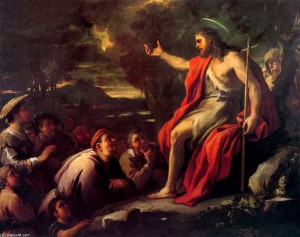
            Five hundred years ago, on the Third Sunday of Advent, Montesinos began his homily with the words of St. John the Baptist, the forerunner of Christ: “Ego sum vox clamantis in deserto†(“I am the voice of one crying in the desert.†Yes, he added, “I am the voice crying out in the desert of this Island.† John the Baptist tells us again in the Gospel for the Third Sunday of Advent (2011): “Make straight the way of the Lord†(Jn 1:23). He invites us this year – as he invited the Dominican community of the Española and many other exemplary communities of missionaries throughout history – to work for justice and love as an essential way to proclaim the Gospel of Jesus of Nazareth. If we proclaim in words and above all in good deeds this constitutive element of the Gospel, we shall contribute significantly to the transformation of the world and thus we will be saved. Jesus – the One who is to come this Christmas and at the end of time and always – keeps telling us: “I was hungry and you gave me food. I was thirsty and you gave me a glass of water… What you do to the least of my brothers and sisters, you do it to me†(see Mt. 25, 31-46).
            As I recall the powerful homily of Montesinos, I remember the words of the great preacher Fr. Lacordaire: “We the Dominicans (and all other preachers) will be effective in our ministry when the Word, dead and buried in books, comes to life in our lips and in our life.†At the end, when all is said and done, we have to say: “Only love is credible†(Urs von Balthasar).
Fausto Gomez, OP
Third Sunday of Advent
 Macau, December 2011
SPIRITUALITY: LITURGICAL SPIRITUALITY:
THE HOLY MASS
            Last Saturday, November 19, 2011, I attended a meditative lecture on the Liturgical Spirituality of the Vatican II Mass, by well-known Benedictine Fr. Anscar Chupungco, OSB. Fr. Anscar had given another lecture the day before on the New English Translation of the Roman Missal: What it is and what it is not. The lectures were organized and sponsored by the Catholic Diocesan Liturgy Commission of Hong Kong. It was opened to all. The Dominican brothers of our three houses (the two in Hong Kong and the one in Macau) were invited as part of their continuing formation program. Brothers from the three houses attended the different lectures. I wish to share some thoughts on the lecture on Liturgical Spirituality.
His lecture was truly a meditative and prayerful lecture. Going through different parts of the Mass, the speaker developed major points, each one fallowed by a long and meaningful prayer recited partly by individual members of the audience and partly by the whole audience. It was a good learning experience for those present. Hereafter, I wish to share with you some points that called my attention and are pastorally significant. These relevant points are: the liturgical assembly, the Word of God, the general intercessions, the preparation of the gifts, the Eucharistic Prayer, and the breaking of the Bread.
The Liturgical Assembly. Vatican II gives particular importance to the liturgical assembly. The liturgical assembly – all the faithful -, is a symbol of the One, Holy, Catholic and Apostolic Church. Christ is present in the assembly made up of saints and sinners, young and old, even perhaps of some enemies that we have to accept and try to reconcile with.
The Word of God. Since Vatican II, the Readings appear more important than before (see Const. of the Liturgy, 50). The Holy Mass is one single act: the liturgy of the Word and of the Eucharist. The Mass is for us the re-experience of Christ’s Teachings and of his Last Supper with the disciples.. Christ is present in his Word, since it is He who speaks (Constitution of the Liturgy, 7 and 33; Hebr 4:12). An interesting point: it does not matter much who reads the Word of God. Through his/her voice, we listen to the message of Christ. Other presences of Christ: in the ordained minister, in the assembly, in the Eucharistic Bread and Wine. (I added in the Open Forum that as it is well-known by all of us, Christ is also present in a special way in the poor. Fr. Chupungco commented, yes that is another – non-liturgical- presence of Christ). What matters – I thought – is not the singer, but the song, not the reader but the message. Another point to note: the full sign of the Cross (composed, as we all know, of three small crosses) before the proclamation of the Holy Gospel: first, we make the sign of the cross on our forehead – to be able to understand the Word; second, we make another sign of the cross on our lips – to proclaim it, and third, we make another sign of the cross on our chest – to be able to ponder the Word in our hearts like Mary.
General Intercessions. This is part of the Liturgy of the Word, which includes the proclamation of the Word, the explanation in the Homily and the response of the people in the general intercessions. It is the family prayer. In it, all priestly people†(the ministers and all the faithful) share in it. It should mainly include the needs of the whole Church and of the world; in particular current calamities and miseries. It is the prayer of the universal Church and, generally, not of individual prayers and petitions (these may be included in a prayer in silence). By the way, the intentions of the Mass could be read at the beginning of the Eucharistic Celebration.
The Preparation of the Gifts. From the first centuries of Christianity, we find bread and wine at the Table of the Eucharist; but at that time and even later on for come centuries the Eucharistic Bread and Wine were not wholly consumed, but some was left to be given to the hungry and thirsty poor. Another interesting detail: why is some water added by the priest to the wine? To remind us all that the Church is the Church of the Poor! We bring bread and wine and other gifts that the faithful present, and offer them to God to be given later to the poor. Thus the Eucharist is real: we offer bread and wine and the other material things to help the poor who need them. In the Prayer that followed we all asked the Lord to teach us to share our blessings with others. Let us add that, as we know, the main theological reason for pouring some water in the chalice with wine is to signify the unity of the divinity and the humanity of Christ, who became flesh, one like us, and also his incredible humility.
The Eucharistic Prayer. It is the center and summit of the whole celebration. Focus: what Christ did personally – and now do through his priests – at the Last Supper. Fr. Anscar said: “’This is my Body,†“This is the cup of my Blood†are the most important words of my whole life. The Blood of Christ reminds us always of the blood of the martyrs, who gave their lives for Christ. “The blood of martyrs is the seed of more Christians.â€
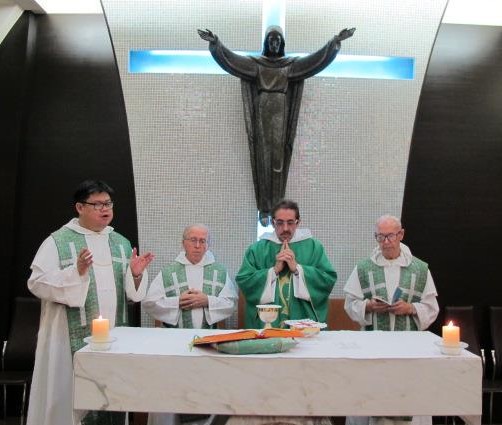
Breaking of the Bread. The bread symbolizes Christ’s violent death. Jesus broke bread to signify his crucifixion (He is ‘broken’ for us!). The priest breaks the Bread to share it with other brothers and sisters. The priest reminds himself that he too has to be broken for the people. The three key words: breaking, sharing, loving. Broken to be shared, broken and shared out of love and for love.
I conclude by adding the following note: understanding the Holy Mass a bit better is always another step to realize in a deeper and deeper way that indeed the Eucharist is – as Vatican II says – the center and summit of our Christian life. No wonder that the first Christians could not live without the Eucharist. In jail, many of these Christians were asked: “Why do you celebrate that ritual when you know that you are going to be taken to jail?†Their common answer: ‘We are Christians, we cannot live without the Eucharist.â€
For the Holy Eucharist, for the Eucharistic Celebration thanks be to God forever and ever. Amen, amen! Â (FGB)

For Christians, the liturgical season of Advent is a very significant one. In the following pages I wish to share with you some thoughts on the meaning and relevance of Advent not only during the season of Advent but through our lives.
I plan to focus my simple meditation first on Advent as hope; second, on hope as fidelity to the present, and third on the usefulness of examining our hope today.
          What is the meaning of Advent?
Â
          THE MEANING AND RELEVANCE OF ADVENT AS HOPE
Through the liturgical year, we Christians celebrate the mysteries of our faith, of our redemption. Through the liturgy, we re-live the life, passion, death and resurrection of Christ. In particular through the Sunday Eucharistic celebration we commemorate joyfully the death and resurrection of Jesus Christ. The Sunday Eucharist is the center of our Christian life. It was so essential in the lives of the first Christians that, they tell us, “They could not live without the Eucharist.â€
The liturgical year begins with Advent and ends with the Solemnity of Christ the King of the Universe. We journey with our Mother Church through Advent, Christmas, Epiphany, Lent, Easter, Pentecost, the weeks of Ordinary Time, the Feasts of the Blessed Trinity, the Holy Eucharist, etc., and through the feasts of our Mother Mary and the saints. The most important seasons of the liturgical year are Advent/Christmas, and Lent/Easter.
 Advent means “coming,†“arriving.†Who is coming? Our Lord Jesus Christ! He came twenty one centuries ago in history; He will come at the end of time, and He continues coming to our lives in different ways. Historically He came the first time when He was born at Bethlehem. Hopefully, we long for his Coming at the end of time – and of our individual time. And lovingly and prayerfully, we hope in his daily coming to our lives.
Advent then means hope. It is the season of hope, in a true sense the season of our whole life, for life is a journey and the human person, a pilgrim with a thousand hopes always on the way to different destinations. Above all, and consciously or unconsciously, every human being hopes in a good final destination – happiness, heaven. Indeed, “You, Lord, have made us for yourself and our hearts are restless until they rest in you†(St. Augustine).
Hope is a theological virtue which inclines us to expect full happiness after the end of this life, that is, we expect God as the object of our happiness. Christian hope is faithful, that is founded on faith in God and practiced in charity or love, which is the form of all virtues and makes our hope walk towards heaven. Hope in heaven, however, does not take away our human hopes but with love nourishes them and transform them in true hopes on the journey of our life. Human hopes which unduly attach us to a person, or a position, or a possession, or a place cannot be authentic human hopes for they are not permeated by faithful and loving hope.
We come from God. We are on the way to God. With the end in view, we journey by steps of hopeful love. We know the lovely story of the old man trying to climb the Himalayan Mountains. It was winter, a cold and rainy day of winter. The old man took refuge for a while in an inn along the way up to the peak. The innkeeper asked him: “Dear old man, how will you ever get there in this kind of weather?†The old man answered him: “My heart got there first, so it is easy for the rest of me to follow.â€
Where is our heart? What does our hope – and hopes – have to do with our present life?
 
HOPE IS FIDELITY TO THE PRESENT
Christian hope – and hopes – is not “a pie in the sky,†but a commitment to change the present – our present. Rooted in the past, looking towards the future, Christian hope concentrates on the present, on the “nowâ€: God, the object of our hope is “the eternal now†(Hebr 3:7-8). The only thing in our hands is not the past or the future but the present. Hence, to be truly hopeful a Christian – and all people of good will – is faithful to the present. “I just keep concentrating on the present moment… Let us see each instant as if there were no other. An instant is a treasure†(St. Therese of the Child Jesus). This is also a Zen teaching: “The past is unreal. The future is unreal. Only the moment is real. Life is a series of moments either lived or lost.â€
What does it mean to live the present, this moment as if there were no other? It means to do what we have to do every moment, every “now†with love. To put love in our daily chores is to do good in every moment and to share it with others. After all, “only the love that we have accumulated throughout our lives stands out, and is the only good that will accompany us†(S. Galilea). “What are your plans for the future?†a journalist asked Blessed Mother Theresa of Calcutta. Her answer: “I just take one day at a time. Yesterday is gone. Tomorrow has not yet come. We have only today to love Jesus.â€
Fidelity to the “now†implies saying ‘yes’ to love and, therefore, ‘no’ to sin, which is a betrayal of love. It also implies to keep walking towards the future, towards God. In his moving Beloved Prophet, Khalil Gibran writes:
The physical consciousness of a plant in midwinter is not directed towards the past summer, but towards the coming spring. The physical memory of a plant is not that of days that are no more, but of days that will be. If plants are certain of a coming spring, through which they will come out of themselves, why can’t I, a human plant, be certain of a spring to come in which I will be able to fulfill myself? Perhaps our spring is not in this life.
Certainly, for those who believe – like the Christians -, the full spring is in the other life, in heaven. “Eye has not seen, ear has not heard nor has it so much as dawned what God has prepared for those who love him†(1 Cor 2:9).
Advent, then, is the proper season to examine our hope. How is our hope – and hopes?
Â
EXAMINING OUR HOPE – AND HOPES
Â
          How is my hope? I have this habit. Every Advent season I examine my human hopes and, particularly, my Christian hope. This meditation helps me animate and revive my hopes.
Some books and texts continue inspiring me as a pilgrim to eternal beatitude. I still remember – and go back to them from time to time – some books from my youth. In the first place, I recall The Little Prince by A. Saint-Exupery. Every time I read the dialogue between the Little Prince and the Fox I am moved. The Little Prince tells the fox that there are no hunters in his little planet; unfortunately for the fox, there are no chickens either: “Nothing is perfect†the fox comments before giving to the Little Prince his simple secret of life: “It is only with the heart that one can see rightly; what is essential is invisible to the eye.†On the pilgrimage of life, theological hope is essential!
I also keep treasuring the book The Parables of Peanuts (well, above all, the Peanuts comic strip) by Robert L. Short that helped me understand the good humor and the theology of Charles Schulz’s Peanuts Family of Charlie Brown, Snoopy, Linus, Lucy and other wonderful kids (adults). I continue enjoying The Way of a Pilgrim and the Russian Pilgrim’s continued mantra: “Lord Jesus Christ have mercy on me, a sinner.†Continuing conversion from sin renews our hope in God. Another traveling companion is The Prophet, by K. Gibran. I love Jonathan Livingstone Seagull (by R. Bach), the winged symbol of my hope. For Jonathan, “It was not eating that mattered but flight – more than anything else, he loved to fly! He was always on the way to a more perfect flight.†During his novitiate in flying, Jonathan was hungry but happy, because he was hopeful. ‘The trick,†he said, “is that we are trying to overcome our limitations in order, patiently.†Once, his mob of birds, interested only in eating, tried to kill him. Jonathan tried to help those hopeless seagulls by loving them! “You have to practice and see the real seagull, the good in everyone, and to help them see it in themselves.†This is love, or better, loving hope.
In a deeper sense, the Sacred Scriptures continue to be the best word on hope for Christians. One of my favorite texts on hope is from Isaiah: “Those who hope in Yahweh will renew their strength. They will soar as with eagle’s wings; they will run and not grow weary; they will walk and never tire†(Is 40:31). The Gospels in particular continue consoling us in the midst of the evil in the world and personal weakness and suffering. They present a portrait of Jesus Christ as our hope, and of his resurrection as the foundation of our hope. Indeed, what better inspiring words than these: In Christ we live; in Christ we shall die, and in Christ we hope to live forever (cf. I Cor 15:20-22).
The saints, particularly Mary the Mother of Jesus and our Mother, are excellent traveling companions. Their lives and works strengthen our Christian hope. Like any saint, Saint Augustine was a hopeful Christian – and writes powerfully and elegantly on life as a pilgrimage. St. Augustine’s Confessions is every time I meditate on it a renewed journey to deeper conversion – and hope! “Happiness does not consist in having more, but in needing less.â€
As a Dominican, St. Dominic, the apostolic and evangelical man, inspires my preaching and my life: the great Dominic, “never asking for reward, he just talks about the Lord.†Reading St Francis of Assisi who went through his journey of life giving thanks with hopeful love. St. Thomas Aquinas, the apostle of truth (Blessed John Paul II), one always learns something new: Every truth, he writes, “regardless who said it, comes from the Holy Spirit.†I continue feeding my roots – and my Christian life – with the works of St. Teresa of Avila and St. John of the Cross. Teresa is a perennial teacher on prayer. She advises us all: “Never leave prayer. There is always remedy for those who pray.†She consoles me: “Let nothing disturb you. / Let nothing frighten you. / All things pass away. / … God alone suffices†– Solo Dios basta! St. John of the Cross is a guide on the dark night of life: “Oh noche que guiaste./ Oh guiding night!/ O night more lovely than the dawn!/ Oh night that has united/ the Lover with His beloved,/ transforming the beloved in her Lover!â€
Among other helpful modern authors – also messengers of hope for me -, I wish to mention Henri Nouwen, Thomas Merton, Anthony de Mello, Paolo Coelho, etc.
CONCLUSION
Sometimes, I feel I am in the desert, alone facing the aridity and the loneliness of life. I try to realize then that my hope is a hope on the way – on the way of Christ, on the way of the cross! My Christian hope tries hard to be a prayerful, patient and persevering hope, to hope with others and for others – particularly with and for the poor. I pray to God – and ask others to pray for me – to help me hope against hope like Abraham (Rom 4:18), to keep my hope in gray days (Zc 4:10).
Facing injustice, violence, the death of innocent children – born and unborn -, the terrible sufferings of a loved person, one is tempted to lose hope. Why God’s apparent silence? I do not know, but I do know – and strongly believe – that He cares, because He loves us and his Son died for us! And I believe and hope in him and in his grace and love for me – for us. And I know that we march to the future – to happiness, to God, to Love, to heaven – with steps of love.
Will Jesus be born in our hearts this Christmas – and through life? The first time He came, there was no room for him in the inn. There will be no room for him this Christmas in the hearts that do not love. May we be ready to say: “Come, Lord Jesus, come!†(See Rev 22:17, 20).
May we all have a hopeful Advent and a peaceful journey of life!
                                            Â
FAUSTO GOMEZ BERLANA, O. P.
                                                       St. Dominic’s Priory,
Macau, Advent 2011
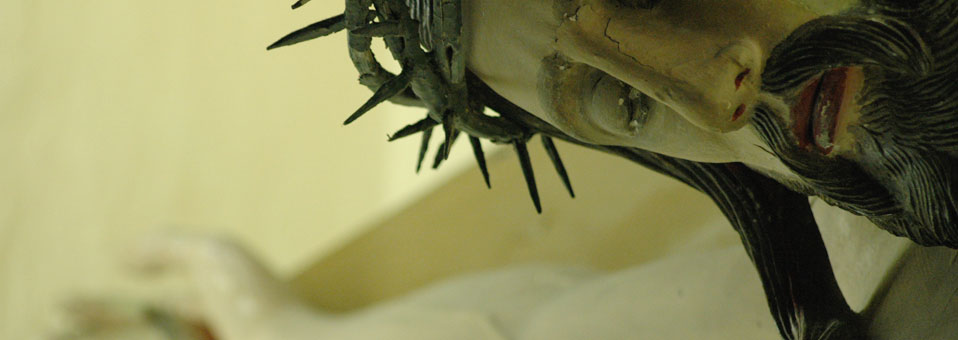
I cannot say “OURâ€
If my religion has no room for other people and their needs.
I cannot say, “FATHERâ€
If I do not demonstrate this relationship in my daily life
I cannot say, “WHO ART IN HEAVENâ€
If all my interests and pursuits are earthly things
I cannot say, “HALLOWED BE THY NAMEâ€
If I who is called by His Name am not holy
I cannot say, “THY KINGDOM COMEâ€
If I am unwilling to give up my sovereignty and accept the will of God
I cannot say, “THY WILL BE DONEâ€
If I am unwilling or am resentful of having Him in my life
I cannot say, “ON EARTH AS IT IS IN HEAVENâ€
Unless I am truly ready to give myself to His service here and now
I cannot say, “GIVE US THIS DAY OUR DAILY BREADâ€
Without expending honest efforts for it
or by ignoring the needs of my fellow man.
I cannot say, “LEAD US NOT INTO TEMTATIONâ€
If I deliberately choose to remain in a situation
Where I am likely to be tempted.
I cannot say, “DELIVER US FROM EVILâ€
If I am not prepared to fight in the spiritual warfare
with the weapon of prayer with His Word.
I cannot say, “AMENâ€
Unless I can honestly say also
“Cost what it may, This is my prayer.â€
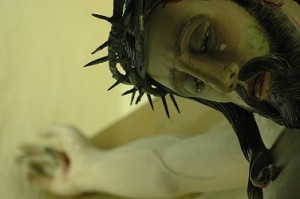

Christ has no hands; he has only our hands
to do his work today.
He has no feet; he has only our feet
to lead humanity in his pathway.
Christ has no lips; he has only our lips
to speak of himself to human beings.
He has no help; he has only our help
to bring men and women into his fold.
We are the one and only Bible that people still read.
We are the last message of God, written in words and deeds.
Anonymous









